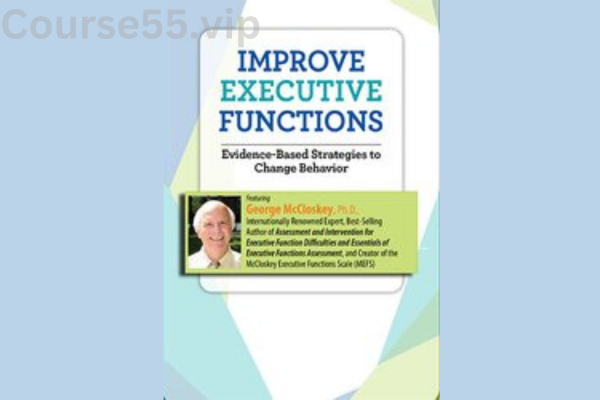Improve Executive Functions: Evidence-Based Strategies to Change Behavior By George McCloskey – PESI
$199.00 Original price was: $199.00.$23.10Current price is: $23.10.
Improve executive functions: evidence-based strategies to change behavior – Digital Download!

Improve Executive Functions: Evidence-Based Strategies to Change Behavior By George McCloskey – PESI
Overview

Enhancing Executive Functions: Proven Strategies for Behavioral Transformation
George McCloskey’s Improve Executive Functions: Evidence-Based Strategies to Change Behavior stands as a foundational work in cognitive development, focusing on refining executive functions through structured, research-backed methodologies. These cognitive processes are crucial for self-management, goal achievement, and resource optimization. Drawing from over 25 years of extensive research, McCloskey introduces a sophisticated framework for assessing strengths and addressing executive function difficulties, particularly in children and adolescents.
Executive functions encompass vital cognitive abilities such as planning, organization, time management, and self-regulation. These skills are integral to everyday functioning, academic success, and social interactions. Standardized tests often fail to capture the full scope of an individual’s executive abilities, making input from parents and teachers essential for a comprehensive assessment. McCloskey emphasizes that evaluating executive functions requires a multi-dimensional approach, considering both behavioral and environmental factors.
Understanding Executive Functions
To appreciate the significance of executive functions, one must first recognize their key components. These functions involve a dynamic interplay of cognitive processes, which can be categorized into distinct areas:
• Planning: The ability to map out steps to reach a goal.
• Organization: Effectively managing resources and information.
• Time Management: Allocating time efficiently to meet deadlines.
• Self-Regulation: Controlling impulses to maintain focus and task completion.
These skills are not fixed but can be developed through targeted interventions. McCloskey’s framework suggests that individuals struggling with executive functions can improve their organization, task management, and overall behavior by implementing the right strategies.
Research conducted by the National Institutes of Health supports this perspective, highlighting that interventions designed to strengthen executive functions significantly enhance academic performance and social relationships. This further underscores the importance of McCloskey’s work in providing actionable methods for cognitive improvement.
Actionable Strategies for Strengthening Executive Functions
McCloskey presents a range of practical strategies that can be effectively integrated into schools, therapy sessions, and home environments. Some key approaches derived from his research include:
• Direct Instruction: Teaching executive function skills explicitly helps individuals understand and develop these essential abilities. Educators can introduce planning and organization techniques through structured lessons.
• Visual Aids: Utilizing charts, lists, and diagrams enhances organization by allowing individuals to visualize tasks, set priorities, and complete assignments more efficiently.
• Environmental Modifications: Creating structured environments that minimize distractions fosters self-regulation and improves focus. For example, a designated quiet workspace can significantly enhance productivity.
• Regular Feedback: Constructive feedback helps individuals track their progress and refine their strategies. Whether in a classroom or therapy setting, goal-oriented discussions promote continuous development.
• Growth Mindset Development: McCloskey highlights the importance of fostering a growth mindset among educators, therapists, and students. Encouraging the belief that executive function difficulties can improve with practice and the right tools cultivates resilience and motivation.
Illustrative Examples of Effective Strategies
• Classroom Visual Supports: Teachers successfully utilize visual schedules to help students stay aware of their daily routines and assignments.
• Time Management Tools: The use of timers and digital reminders aids students in managing their schedules by breaking tasks into structured time intervals.
By seamlessly incorporating these methods into educational and therapeutic settings, professionals can help individuals develop essential skills to navigate daily challenges with greater efficiency.
The Role of Key Stakeholders in Executive Function Development
The development of executive functions requires the active involvement of multiple stakeholders, including parents, educators, and therapists. Their collaborative efforts provide a supportive framework that helps individuals recognize strengths and work on areas of difficulty. The roles and responsibilities of these key stakeholders are outlined below:
| Stakeholder | Role and Responsibility |
|---|---|
| Parents | Observe and reinforce behavior at home, provide continuous feedback. |
| Educators | Implement executive function strategies in the classroom and tailor instruction accordingly. |
| Therapists | Provide direct interventions, monitor progress, and adjust strategies as needed. |
Through the combined efforts of these stakeholders, individuals receive consistent guidance, reinforcing the development of executive function skills.
The Impact of Executive Functions on Life Outcomes
The influence of executive functions extends far beyond academic settings. Strong executive functioning skills are tied to positive life outcomes, including better job performance, healthier relationships, and overall life satisfaction. McCloskey’s work emphasizes that enhancing these functions is crucial not only for children’s academic success but also for their long-term well-being.
Research has shown that people with well-developed executive functions often excel in various areas of life. They tend to make more thoughtful decisions, manage stress more effectively, and maintain healthier interpersonal relationships. This underscores the necessity of employing McCloskey’s evidence-based strategies to cultivate these skills at a young age.
Conclusion
In simple terms, improving executive functions through the structured strategies outlined by George McCloskey offers a transformative approach to cognitive and behavioral development. His practical methods emphasize the importance of explicit instruction, environmental modifications, and collaborative support in fostering executive function skills.
Improve Executive Functions: Evidence-Based Strategies to Change Behavior serves as both a practitioner’s guide and a resource for individuals seeking to strengthen their executive abilities. By adopting a growth mindset and applying these strategies, individuals can unlock their full potential, refine their problem-solving skills, and enhance their academic, social, and personal success.
Frequently Asked Questions:
Business Model Innovation: We operate a group buying strategy, allowing participants to share costs and access popular courses at reduced prices. This model benefits individuals with limited financial resources, despite concerns from content creators about distribution methods.
Legal Considerations: The legality of our operations involves complex issues. Although we don’t have explicit permission from course creators to resell their content, there are no specific resale restrictions stated at the time of purchase. This ambiguity creates an opportunity for us to provide affordable educational resources.
Quality Control: We ensure that all course materials purchased are identical to those offered directly by the creators. However, it’s important to understand that we are not official providers. As such, our offerings do not include:
– Live coaching calls or sessions with the course author.
– Access to exclusive author-controlled groups or portals.
– Membership in private forums.
– Direct email support from the author or their team.
We aim to reduce the cost barrier in education by offering these courses independently, without the premium services available through official channels. We appreciate your understanding of our unique approach.
Be the first to review “Improve Executive Functions: Evidence-Based Strategies to Change Behavior By George McCloskey – PESI” Cancel reply
You must be logged in to post a review.

















Reviews
There are no reviews yet.